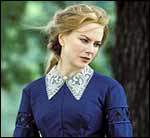 A long-drawn story dealing with war, destruction and hope, Cold Mountain is also about the discoveries its main characters, especially the one-named soldier Inman, make around themselves and within their own souls.
A long-drawn story dealing with war, destruction and hope, Cold Mountain is also about the discoveries its main characters, especially the one-named soldier Inman, make around themselves and within their own souls.
Though the film is set against the Civil War, its story of war and longing could have taken place anywhere across the globe. That is good news for this admirable film directed by Anthony Minghella.
For the $80 million film, while not being anywhere as expensive as the likes of Master And Commander, should do excellent business worldwide to recoup its investment.
| |||||||||||
Both deal with similar themes, including the fate of lovers separated by war. In both films, the male protagonist cares more for his personal life than for war and the fame that bravery and sacrifice could bring to him. There is fine irony here as Inman, who is a deserter and who could become a pacifist, is forced into numerous acts of violence as he makes a long trek to meet his beloved.
Each film takes its own road, and the more detailed battle scenes early on in Cold Mountain are far more vivid and graphic than the fleeting war scenes in The English Patient. However, the older film managed to pack in more passion and urgency than the new one.
The beautifully mounted Cold Mountain often moves a bit too slowly, thus restricting its commercial appeal. But the moment Renee Zellweger, who plays a farmhand, appears some 40 minutes after the film has opened, and bonds with the hopeless farm owner (Nicole Kidman), the film acquires quite a bit of electricity.
 Frazier's book was full of colourful details of the Civil War period, though some critics complained it had very few black characters. You don't have to read the book, which was a national bestseller for over a year and won the National Book Award, to understand and appreciate the film version. The film does not spend too much of its time on specific politics.
Frazier's book was full of colourful details of the Civil War period, though some critics complained it had very few black characters. You don't have to read the book, which was a national bestseller for over a year and won the National Book Award, to understand and appreciate the film version. The film does not spend too much of its time on specific politics.
Minghella is interested in portraying the complex and interesting relationship between the two women -- the farm owner and the helper -- and the steadfast devotion with which the soldier and his lover wait for each other over a three-year period filled with uncertainties every day.
The beautiful lensing by John Seale highlights both the horror of war and the enchantment of a life of steadfast love. The movie also offers many other pleasures, very good performances being one of them. Many smaller characters, including a healer played by Eileen Atkins (who is mesmerising New Yorkers in the splendid play Retreat From Moscow) make the film even more interesting.
Private Inman (Jude Law) deserts the confederate Army in 1864 and is making a Homeric journey home from Virginia to North Carolina and tries to forget the horrors of the war. He is going back to Ada (Nicole Kidman), the beautiful daughter of a pastor (Donald Sutherland) in Cold Mountain, a tiny North Carolina town. Though he had exchanged just one passionate kiss with her three years ago on the day his regiment marched off to war, he has become obsessed with her.
What triggers his journey is a letter he received from her while he was recovering from a battle wound in a hospital: "If you fight, stop fighting, if you march, stop marching. Come back to us is our request."
Ada seems to be a southern woman with a difference: she has freed the handful of slaves she had inherited along with the farm after her father's death. This is one of the film's weakest areas. We never really know if Ada was aware of the risk she was taking in freeing the slaves.
As Inman travels a few hundred miles in the middle of a winter, he has to be careful not to be caught either by the Union soldiers or the Confederate ones.
Among the characters he meets on the journey that continually test his endurance and values is Veasey, a disgraced minister (Philip Seymour Hoffman). In the dramatic confrontation between the two men, it is revealed that the preacher has impregnated a black woman. Since Veasey was caught while trying to dump the pregnant woman in a river, Inman has to decide what kind of punishment should be meted out to him. This is one of the many situations in the film that calls for swift thinking and an uneasy decision to be made.
Another memorable encounter Inman has is with Sara (Natalie Portman), a young widow and mother whose goodness in giving shelter to him leads her into complications.
Meanwhile, we learn that in Cold Mountain town, there is much poverty and lawlessness. Leading a group of rowdies is Teague (Ray Winstone) who wants to, among other things, get hold of Ada's property. He also wants the young woman.
Ada, who seemed destined for a more sophisticated career and who can speak French and Latin, struggles to maintain the farm and fails miserably. But when a resourceful drifter Ruby (Renée Zellweger) joins her, Ada's personality changes. The roles are suddenly reversed now; Ada has a lot to learn from Ruby who is illiterate. And Ruby, in turn, has to learn from Ada.
Minghella creates a believable relationship between the two women. Their friendship and bond doesn't, for instance, blossom overnight.
But complications ensue when Ruby's father (Brendan Gleeson) and his fellow musicians, who have given up on the war and composing ballads, face opposition.
As the film moves to its climax, the viewers are becoming increasingly aware of the effects the war continues to have all around its key characters.
The fine performances by over a dozen actors, including the quietly menacing Ray Winstone, are among the many pleasures the film offers. The haunting musical score by Gabriel Yared is another winning achievement. The songs and the rest of the soundtrack enhance the film's constantly changing mood.
CREDITS
Cast: Jude Law, Nicole Kidman, Renee Zellweger, Eileen Atkins, Ray Winstone, Brendan Gleeson, Philip Seymour Hoffman, Natalie Portman, Donald Sutherland
Director: Anthony Minghella
Writer: Anthony Minghella based on a novel by Charles Frazier
Running time: 2 hours 35 minutes
Rating: R for battle scenes and sexuality
Distributor: Miramax





